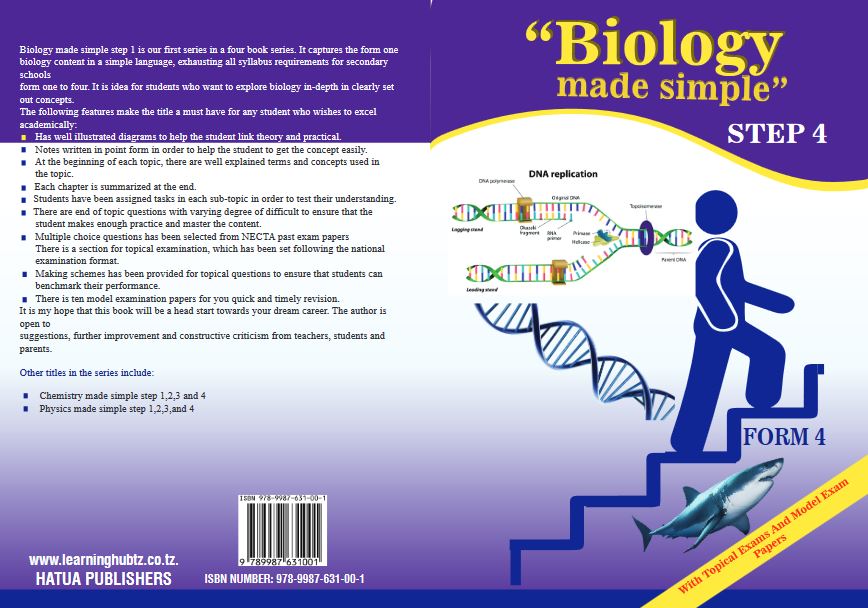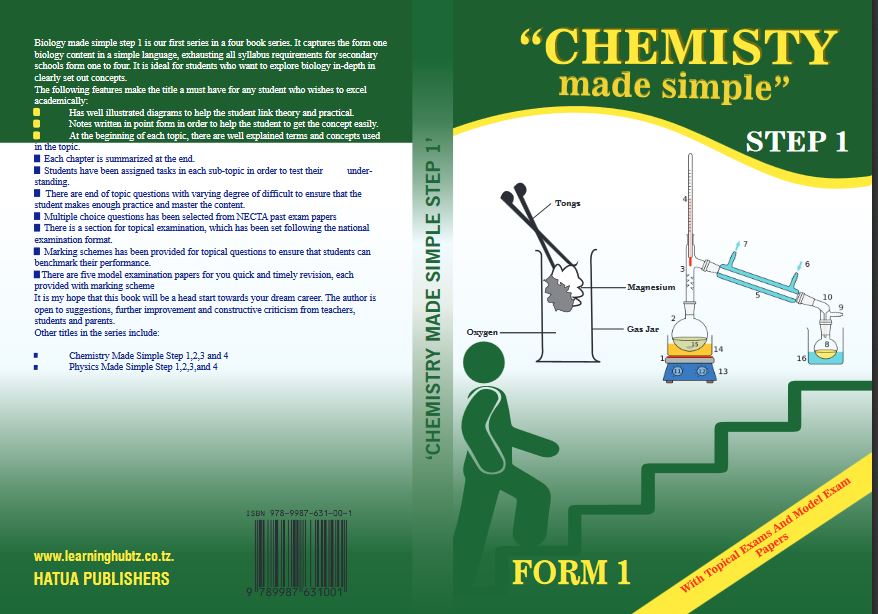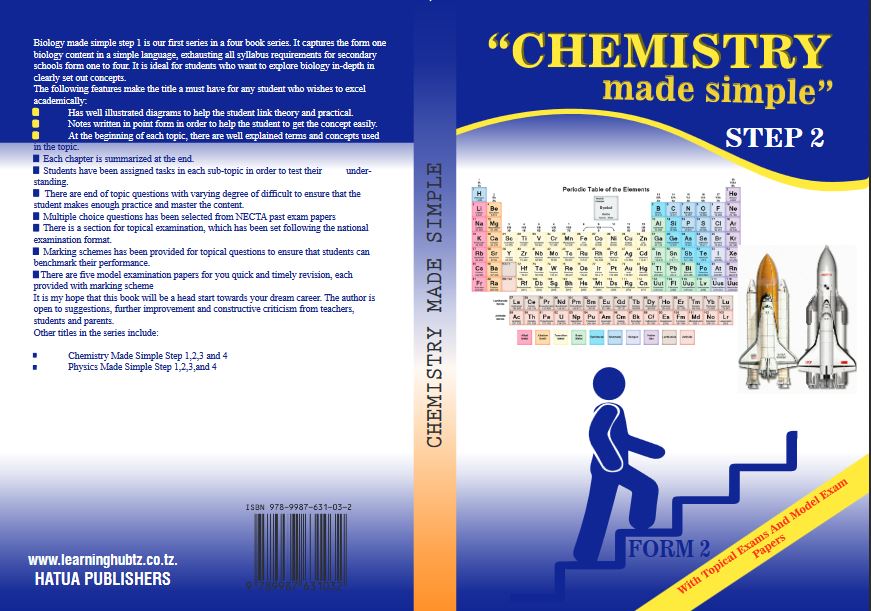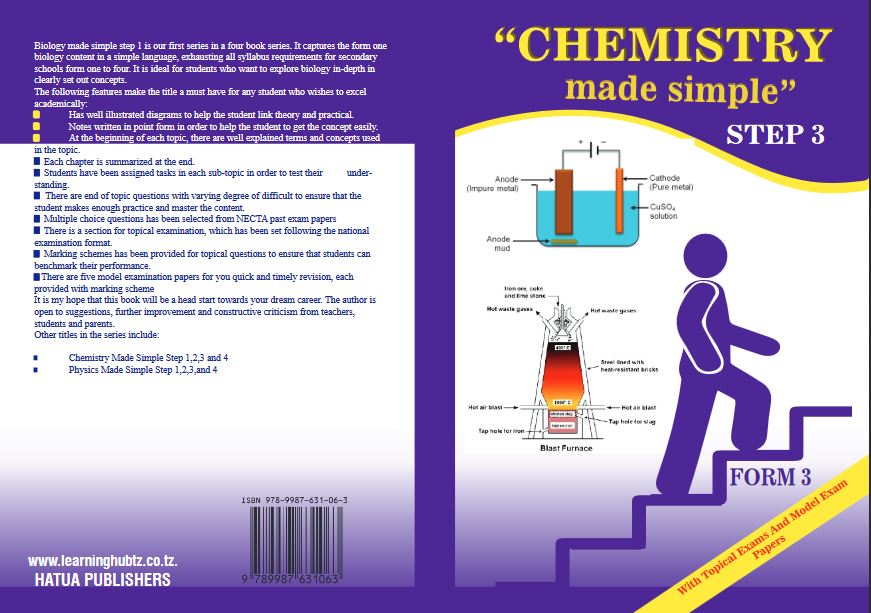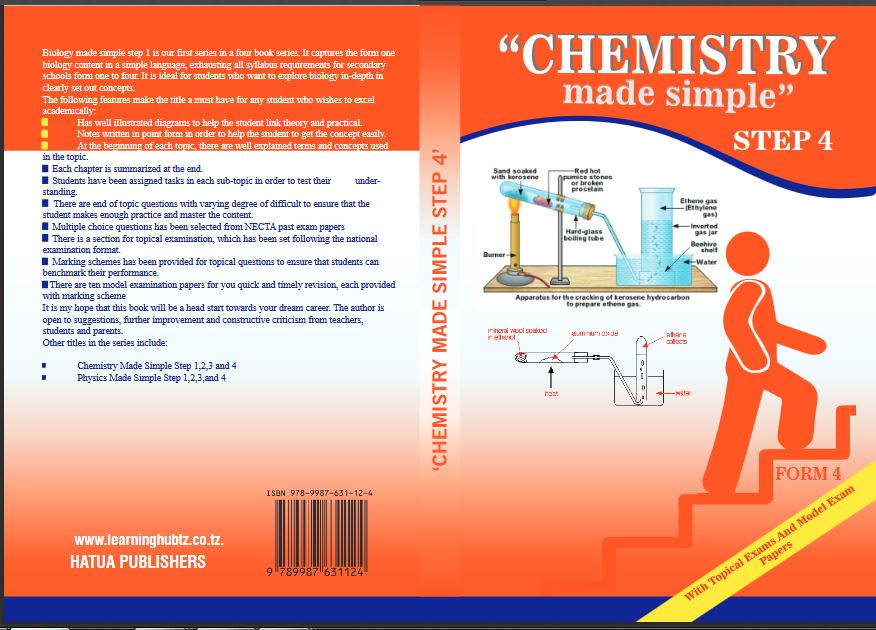LEARNING HUB.TZ
BIOLOGY EXAMINATION FORM ONE
TOPICAL EXAMINATIONS.
INTRODUCTION TO BIOLOGY.
NAME ..CLASS TIME: 21/2HRS
INSTRUCTIONS:-
This paper consists of sections A, B and C
Answer all questions
All answers must be written in the spaces provided
All writings should be in blue/black inks except for drawings that should be in pencils
PART A:
Choose the correct answer in the following questions and write it beside each question { 20marks }
What does science deals with?
Study of environment
Study of medicine and car manufacturing
Study of microscope
Study of nature by experiment and observation
The following is the list of subjects that are studied under science
Geography, physics and history
Mathematics, economy and book keeping
Physics, chemistry and biology
History, civics and English
Commerce, agriculture and language
Biology is the subject that deals with ..
Study of cells
Study of life
Study of anatomy
Study of animals
The organ that is used for hearing is called ..
The ear
The eye
The nose
The skin
Walking process is done by
Head
Fingers
Arms
Legs
The fish like tilapia breathe through
Lungs
Spiracles
Gills
Skin
Deficiency of iodine in the body can lead to disease called
Rickets
Goiter
Night blindness
Diabetes
One of the following is not the laboratory rules
Observing good table manner during eating
Do not enter in the laboratory without permission
Report any accident to the teacher or lab. Technician
Do not eat, drink or taste anything in the laboratory
Waste can be defined as
Wanted materials
Pleased materials
Overused materials
Unwanted materials
One of the following is not the living things characteristics
Movement
Growth
Digestion
Respiration
MATCHING ITEMS QUESTIONS.
|
LIST A |
LIST B |
|
|
Fill the spaces provided;
Skills in studying biology include , .,
A scientist can be able to reject or accept hypothesis by doing .
To preserve animals like snakes, and fish in the laboratory of biology we use .
The study of mushroom, toad stool, and mucor ..
The person who studies botany
The study of insects is called .
The study of how the body of humans functions .
Another name for veterinary is ..
Gaseous exchange take place between organisms and ..
The giving rise to new individual of the same kind is .
Fill in the blanks:
Who is a biologist?
Movement done by most animals is known as
Plants also have their movement where by plants roots and shoots move towards water, gravity and light this movement is known as ..
Give the meaning of biology
Movement is important since it help organism to obtain food, , and
State six scientific methods you know.
Write down five fields related to biology
.
.
.
.
..
Define the word biology
Write down 3 importance of studying biology
i
ii
iii .......
List down 4 branches of biology
i .
ii
iii ..
iv ..
Give five branches of biology
_____________________________________________________
______________________________________________________
______________________________________________________
______________________________________________________
______________________________________________________
Mention characteristics of living things (7)
_____________________________________________________
______________________________________________________
______________________________________________________
______________________________________________________
______________________________________________________
______________________________________________________
______________________________________________________
LEARNINGHUBTZ.CO.TZ Page
LEARNING HUB.TZ
BIOLOGY EXAMINATION FORM ONE
TOPICAL EXAMINATIONS.
BIOLOGY LABORATORY
NAME ..CLASS TIME: 21/2HRS
INSTRUCTIONS:-
This paper consists of sections A, B and C
Answer all questions
All answers must be written in the spaces provided
All writings should be in blue/black inks except for drawings that should be in pencils
SECTION A:
Write TRUE if the statement is correct and FALSE if the statement is wrong;
A laboratory is a special room designed and equipped for scientific investigations.
Thermometers and burners are only found in the biology laboratory.
Laboratory safety rules are formulated to frighten students.
Corrosive chemicals can burn books and clothes because they catch fire easily.
Using microscope biologists have been able to observe very small organisms.
A scientific procedure only involves observation and Experimentations.
To be accurate scientists use special tools to take measurements.
A hypothesis is idea or explanation that is proposed to answer the observed problem.
Interpretation means investigation.
Pulse rate can only measured by qualified doctors.
-
A
B
C
D
E
F
G
H
I
J
Choose the most correct answer below;
Which of the following will be a sequence to follow in a scientific procedure?
Observation and data recording
Hypothesis and formulation
Conclusion
Problem identification
In biology Experiment is used to test a;
Low B. Theory C. Hypothesis D. Problem
Interpretation means;
To make sense of information
Investigation
Evaluation
Guessing
If you look at cells in frog muscles, you will observe that in this frog cells contain nuclei but luck cell wall. The statement that frog muscles contain nuclei but no cell wall is termed as;
Hypothesis
Conclusion
An assumption
None of the above
If you want to heat chemicals in biology you will use;
Petri dish C. Bunsen burner
Hand lens D. Motor
.. is the number of times the heart beats per minute;
A. Pulse B. Pulse rate C. Artery D. Temperature
The study of Fungi is known as;
A. Anatomy B. Mycology C. Genetics D. Cytology
.. is the study of developing drugs and medicine;
Medicine B. Biology C. Pharmacy D. Agriculture
Walking, crawling and dancing is an example of;
Movement B. Locomotion
C. Activities D. Characteristics of living things
.. refers to internal body heat;
Pulse B. Pulse rate C. Temperature D. Body temperature
-
i
ii
iii
iv
v
vi
vii
viii
ix
x
Fill the spaces provided;
Skills in studying biology include , .,
A scientist can be able to reject or accept hypothesis by doing .
To preserve animals like snakes, and fish in the laboratory of biology we use
It is also used to magnify things other than microscope ..
If you want to catch flying insects you will use
Readings in measurements are recorded in standard units called .
We use tools in measurements because sense organs are .
Another name for veterinary is ..
Gaseous exchange take place between organisms and ..
The giving rise to new individual of the same kind is .
SECTION B:
(a) Define biology laboratory
(b) List at least four factors to consider while constructing the biology laboratory.
i. .
ii.
iii. ..
iv. ..
(a) What is the aim of laboratory safety rules?
(b) Mention at least four safety rules when youre in the biology laboratory;
i. . ii.
iii. . iv. ..
Define the following terms;
Control experiment
Mass
Scientific procedures
Measurements
Biology
List down any five measurements in biology and give their SI units.
-
Measurement
SI units
Differentiate between;
Specimen and model
Temperature and body temperature .
Fact and theory .
Index and thumb
SECTION C:
Draw and explain one function of each of the following biology laboratory apparatus and equipments.
Test tube holder
Test tube rack
Petri dish
Motor and pestle
Test tube brush
LEARNINGHUBTZ.CO.TZ Page
LEARNING HUB.TZ
BIOLOGY EXAMINATION FORM ONE
TOPICAL EXAMINATIONS.
FIRST AID AND SAFETY
NAME ..CLASS TIME: 21/2HRS
INSTRUCTIONS:-
This paper consists of sections A, B and C
Answer all questions
All answers must be written in the spaces provided
All writings should be in blue/black inks except for drawings that should be in pencils
SECTION A
MULTIPLE CHOICE QUESTIONS
If you dont have gloves, you can also use--------------- to protect your hands
Socks
Plastic bag
Tins
A piece of cloth
When giving first aid, to a snake bite victim you should not
Cut the wound
Calm them down
Remove jewellery from bitten limb
Lower the bitten area.
A victim of poisoning should not be;
Forced to vomit
Given water
Given milk
Given anything by mouth
A decrease in supply of blood in the head can lead to;
Heart attach
Drowning
Fainting
Shock
Which of the following will not be found in a first aid box?
Amoxylin tablets
Razorblade
Panadol
Iodine tincture
Which of the following should not be done to a person bitten by insects such a bees
Apply a cold compress
Scrape the stings using a blunt object
Use fingers to remove stings
Apply baking soda in case of acidic sting
The following are importance of first aid except
Cures the person
Give hope and encouragement
Reduces pain
Reduces excessive loss of blood
Which of the following will protect a person from contamination when giving first aid?
Scarf
Boots
Apron
Gloves
Which of the following is best use of adhesive bandage?
Cleaning the wound
Covering small wound
Cleaning wound to kill germs
Applying medicine
Which of the following is not a cause of muscle cramps?
Poor coordination of muscles
Cold weather
Drinking alcohol
Excessive salts in the body
The following statements are either true or false. Write T for true statement and F for false statement.
Induce vomiting if a person has swallowed medicine
First aid help reassure the patient
First aid should be given by a qualified physician
Remove bee stings using needles
Before taking a victim of snake bite to hospital, capture the snake
A victim of snake bite should be given alcohol to relieve pain
It is important to reduce the rate of poison spread in the body
Use a strong metallic object to remove a victim of electric shock from the source
A person who is nose bleeding should bend upward to reduce blood flow.
We can use clean water, salt and sugar to make a hydration drink for a person who has vomited.
Matching item questions
|
LIST A |
LIST B |
|
|
SECTION B.
a) Define the following terms
first aid
first aid kit
b) Who should give first Aid?
c) Give the benefits of giving first Aid to an accident victim.
5. (a) state the steps that should be taken to prevent yourself from getting infections when giving first aid.
b) Briefly give the uses of the following items in a first aid kit
i) Bandage
ii) Safety pins
Thermometer
Whistle
6. Outline the procedure of giving first Aid to an accident victim
a) Snake bites
b) Electric shock
7. (a) what are muscles cramps
b) Give the causes of muscle cramp
c) Mention ways of preventing muscle cramps
8. Mention ten common accidents which can occur at home.
9. Identify six items found in a first aid kit an state their uses.
LEARNINGHUBTZ.CO.TZ Page
LEARNING HUB.TZ
BIOLOGY EXAMINATION FORM ONE
TOPICAL EXAMINATIONS.
HEALTH AND IMMUNITY
NAME ..CLASS TIME: 21/2HRS
INSTRUCTIONS:-
This paper consists of sections A, B and C
Answer all questions
All answers must be written in the spaces provided
All writings should be in blue/black inks except for drawings that should be in pencils
TIME: 2:00 HOURS
SECTION A:
Multiple choice
In natural immunity foreign bodies can be fought inborn chemicals passed from the mother to the baby. Chemicals are;
Antigens B. Antibodies C. Pathogens D. Toxins
In biology antibodies are;
Substances causing diseases
Specific to specific antigens
Any foreign bodies
Very poisonous to the body
A type of immunity that is not produced by the body but acquired through immunization is ...
Antibodies B. Antigens C. Artificial D. Natural Immunity
Form one students were injected with a readymade vaccine against snake bites. That type of vaccination is an example of;
Passive artificial
Passive natural immunity
Active artificial immunity
Active natural immunity
Tumaini has a new born baby. She is worried about measles. Tumaini can prevent her baby against measles by;
Active artificial immunity
Artificial passive immunity
Active natural immunity
Natural passive immunity
Which of the following is not a requirement of personal Hygiene?
Tooth brush and tooth paste
Soap and clean water
Mobile phone D. Towels
All of the following changes occur only in boys at puberty except one. Which one is it?
Beards grow
Voise softens
Hair grows in pubic regions
Sperm production begins
Which one of the following is not a way of maintaining personal Hygiene?
Maintaining short and clean nails
Frequent bathing
Sharing towels and combs
Brushing teeth in the morning only
Which of the following is not an act that shows good manners towards others?
Proper dressing
Covering your mouth while sneezing and coughing
Abusing people who do not behave responsibly
Listening to others when they are speaking
Which one of the following types of immunity involves passage of antibodies from mother to unborn baby across the placenta?
Natural Passive immunity
Artificial passive immunity
Natural active immunity
Artificial active immunity
-
i
ii
iii
iv
v
vi
vii
viii
ix
x
Write TRUE or FALSE for the following statements;
Health is a state of body fitness. ..................................
Regular physical exercises make the body weak. ...............................
Introduction of weakened or killed pathogens in the body in order to fight diseases is called vaccination. ................................
Active natural immunity lasts throughout human life. ..............................
There is no difference between disease and infection. .................................
Passive natural immunity lasts throughout human life. ...........................
There is no difference between disease and infection. ............................
Another name for antigen is antibody. ............................
Insecticides emit gaseous waste .........................................
Food remains can be burnt. ....................................
Match the following items
LIST A
Discarded vegetables and dead animals.
Site of dumping waste and covering with soil.
Burning of waste.
Making useful products from waste.
To use products more than once.
Waste products that can transmit diseases.
A practice whereby each urban dweller is given a dustbin to put in waste and waste is collected by trucks.
Parasites
Invaders
Resist infection and diseases
LIST B
Pathogens vii. Medical waste
Antigens viii. Tipping organic matter
Immunity ix. Waste disposal
Incineration x. Hazardous waste
Pit latrine xi. Land fill
Recycling xii. re use
-
A
B
C
D
E
F
G
H
I
J
(a) (i) Define puberty ..........................................................................................................................................................................................................................................................................................................................
(ii) Adolescence ..........................................................................................................................................................................................................................................................................................................................
(b) Mention changes which take place during for both boys and girls (4) ....................................................................................................................................................................................................................................................................................................................................................................................................................................................................................................................................................................................................................................................
(c) How is cleanliness maintained during puberty? Give four points ....................................................................................................................................................................................................................................................................................................................................................................................................................................................................................................................................................................................................................................................
(a) (i) what is good manners? .........................................................................................................................................................................................................................................................................................................................
(ii) Personal hygiene ..........................................................................................................................................................................................................................................................................................................................
(b) Mention at least four health rules; ....................................................................................................................................................................................................................................................................................................................................................................................................................................................................................................................................................................................................................................................
(c) Name any two diseases that may be caused by lack of personal hygiene during puberty. ..........................................................................................................................................................................................................................................................................................................................
List down any five factors that may weaken body immunity. .................................................................................................................................................................................................................................................................................................................................................................................................................................................................................................................................................................................................................................................................................................................................................................................................................
Distinguish between;
Body health and immunity ............................................................................................................................................................................................................................................................................................................
Natural and artificial immunity ............................................................................................................................................................................................................................................................................................................
Pathogens and antibodies ............................................................................................................................................................................................................................................................................................................
Immunization and vaccines ............................................................................................................................................................................................................................................................................................................
(i) When the pathogens enter the body they may produce .................................................................
(ii) Any foreign substance which enters the body is called ...............................................................
(iii) Pathogens and their toxins are examples of ........................................................................
(iv) Babies get immunity from their mothers through ............................. , ...................................
Look at the following stuffs.
Broken glasses, food remains, polythene bags, used pads, potato peelings, broken pots, bones human waste, litters.
What is the name given to such stuff? .................................................................................
Classify them into two major groups ............................................................................................................................................................................................................................................................................................................
Mention all methods which are used to dispose them off. ..............................................................................................................................................................................................................................................................................................................................................................................................................................................................................................................................................................................................................................................................................................................................................................................
(a) Give at least 4 examples of drugs and cosmetics
(i) drugs .........................................................................................................................................................................................................................................................................................................................
(ii) cosmetics ..........................................................................................................................................................................................................................................................................................................................
(b) State any three advantages of
(i) Cosmetics .......................................................................................................................................................................................................................................................................................................................................................................................................................................................................................
(iii) Drugs .......................................................................................................................................................................................................................................................................................................................................................................................................................................................................................
LEARNINGHUBTZ.CO.TZ Page
LEARNING HUB.TZ
BIOLOGY EXAMINATION FORM ONE
TOPICAL EXAMINATIONS.
CLASSIFICATION
NAME ..CLASS TIME: 21/2HRS
INSTRUCTIONS:-
This paper consists of sections A, B and C
Answer all questions
All answers must be written in the spaces provided
All writings should be in blue/black inks except for drawings that should be in pencils
SECTION A.
MULTIPLE CHOICE QUESTIONS
The study of virus is called?
Virology
Virology
Virologous
Vitology
Which of the following is not a characteristic of a virus?
They reproduce when inside the host cell
Have complex membraned cell organelle
They have a protein coat called capsid
They have capsids
Which of the following is an advantage viruses
They cause diseases
They are source of protein
They can attach and kill bacteria
Lead to large scale epidermics
Which of the following is not a feature of bacteria?
They are unicellular
All are parasitic
They prokaryotic
They can produce through binary fussion.
The following are advantages of kingdom monera, except one which one?
They help in digestion of substances in the body of rumunants
They help in fixing nitrogen
They are good source of single cell protein
They help in recycling of nutrients
Bacteria are able to move with the help of?
Flagella
Cilia
Pseudopodia
Tail
Which of the following is wrongly matched?
Rhizopoda Rhizoids
Apicomplexa plasmodium
Euglenophyta- euglena
Zoomastigina- Trypanosoma
Identify the organism that can photosynthesize
Amoeba
Paramecium
Euglena
Plasmodium
The causative agent for malaria is?
Amoeba
Plasmodium
Trypanosome
Female anopheles mosquito
Which of the following is not a feature of paramecium?
They are autotrophic
They use contractile vacuole to regulate water in their body
Can produce both sexually and asexually
Their body is covered with pellicle
2. Matching items questions.
|
LIST A |
LIST B |
|
|
3. The following statements are either true or false. Write T for true and F for false statement.
i) all bacteria are harmful
ii) protoctists are heterotrophic in nature
euglena bloom are beneficial to fish
paramecium has a contractile vacuole which regulates amount of water
amoeba reproduces by binary fission
viruses reproduces by cell division
most viral diseases can easily be cured
bacteria can be used in sewage treatment, by feeding on it and rendering chemicals harmless
paramecium is an example of a complex cell
the eye spot in euglena is used in photosynthesis
SECTION B.
4. a) Name the different shapes of bacteria
b) List any four advantages of bacteria
c) Outline the harmful effects of viruses.
5. a) Provide the scientific names of the following;
i) Tuberculosis
ii) Cholera
iii) Tetanus
iv) syphilis
b) mention four diseases caused by viruses
c) what do you understand by the term virology?
6. a) Name one disease that is caused by the following;
i) Amoeba
ii) Paramecium
iii) Plasmodium
b) Draw and label clearly the structure of amoeba.
7. a) Mention five phylas of kingdom protoctista
b) Provide the locomotary structure of the following organisms;
i) Amoeba
ii) Paramecium
iii) Euglena
iv) Plasmodium
c) List down the phylas of kingdom protoctista
8. a) What is a virus
b) Give reasons to support that viruses are;
i) Non-living
ii) Living things
c) Explain why viral diseases are difficult to cure
9.a) Give the distinctive features of protoctists
b) Explain the economic importance of protoctist.
10. a) different pathogenic and non-pathogenic bacteria
b) Provide the economic importance of kingdom monera.
LEARNINGHUBTZ.COM Page
LEARNING HUB.TZ
BIOLOGY EXAMINATION FORM ONE
TOPICAL EXAMINATIONS.
KINGDOM FUNGI
NAME ..CLASS TIME: 21/2HRS
INSTRUCTIONS:-
This paper consists of sections A, B and C
Answer all questions
All answers must be written in the spaces provided
All writings should be in blue/black inks except for drawings that should be in pencils
MULTIPLE CHOICE QUESTIONS.
i) Which one of the following is not an example of organisms in Kingdom Fungi?
A. Mushroom B. Puffballs
C. Amoeba D. Yeast
ii) The following are phyla in kingdom fungi. Which one is not?
A. Bryophyta B. Ascomycota
C. Zygomycota D. Basidiomycota
iii) Which one of the following is a characteristic of division Bryophyta?
A. Plant body is not differentiated into roots, leaves and stem.
B. They have well developed conductive tissues.
The plant body is made up of hyphae.
They store glycogen.
iv) A biologist discovered a new cell in a culture. The new cell had a distinct cell wall but it did not have a definite nucleus. The cell is mostly likely to be;
Fungi
Prokaryote
Eukaryote
Virus
v) The body of a fungi is organized into threadlike structures called
A. Chitin
B. Hyphae
C. Mycelium
D. Thallus
vi) Which of the following is not an ascomycetes?
Yeast
Cup fungi
Rhizopus stolonifer
Ringworm fungi
vii) The part of a mushroom that produces basidiosphores is the;
Pileus
Gills
Hyphae
Stipe
viii) Bryophytes need water for;
Fertilization
Pollination
Transport of substances
Digestion of food
ix) The leaves of a fern plant are called
Pinnae
Rachis
Fronds
Prothallus
x) Which of the following does not show alternation of generation?
A. Liverworts
B. Mosses
C. Fern plant
D. Puffball
2. Matching items questions.
|
LIST A |
LIST B |
|
|
SECTION B.
Briefly outline the general and distinctive features of Kingdom Plantae.
Draw a clearly labelled diagram of a moss plant.
Write two advantages and two disadvantages of mosses.
Draw a clearly labeled diagram of a fern plant.
Give one advantage and one disadvantage of a fern plant.
List the following;
Three advantages of fungi
Two disadvantages of mosses
Four divisions of kingdom plantae
10. (A) Draw and label the structure of mushroom
b) Give five economic importance of the
LEARNINGHUBTZ.COM Page
Hub App
 For Call,Sms&WhatsApp: 255769929722 / 255754805256
For Call,Sms&WhatsApp: 255769929722 / 255754805256
 For Call,Sms&WhatsApp: 255769929722 / 255754805256
For Call,Sms&WhatsApp: 255769929722 / 255754805256


